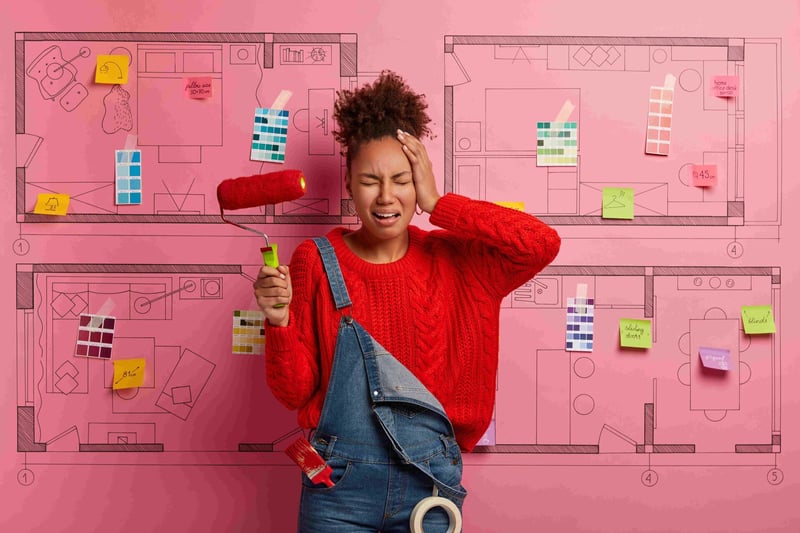Buying a Fixer-Upper Property - 7 Things Every Investor Should Check
Written by: Sam Bartlett Save to Instapaper
Purchasing a fixer-upper can be an exciting and rewarding project, potentially yielding high returns. However, it comes with risks, and if you don't thoroughly assess the property, what appears to be a bargain could quickly turn into a costly nightmare.
Arnold Maritz, Co-Principal for Lew Geffen Sotheby’s International Realty in Cape Town’s Southern Suburbs, emphasises the importance of first-time investors going in with their eyes wide open:
Once you've found a potential project, a thorough inspection is essential. Document everything with photos and notes for contractors. Avoid being swayed by emotion or skipping any inspection steps just because you love the property. Falling in love with a house before assessing its problems can lead to months of stress and financial strain.
Seven Critical Factors to Check Before Buying
1. Structural Integrity
Assess the home’s structural integrity. Major structural issues are costly to repair and may pose safety hazards. Look for large cracks in the foundation, uneven floors, sagging ceilings, or gaps around door and window frames.Hiring a structural engineer to inspect the property is a worthwhile investment to uncover any foundational problems that aren’t immediately visible. If issues are identified, consult a contractor to estimate repair costs before committing.
2. Roof Condition
A home’s roof is critical, and replacing it is expensive. Check for missing, cracked, or curling shingles and signs of water damage in the attic or ceilings. Water stains or leaks may indicate an aging roof.If the roof is over 15-20 years old, budget for a replacement and ask if there are any warranties or guarantees that can be transferred to you.
3. Plumbing and Electrical Systems
Outdated plumbing and electrical systems can pose serious safety risks.
- Check for leaks, rusty pipes, low water pressure, or slow drainage. If the house has lead or galvanized steel pipes, you might need to replace the whole system.
- Inspect electrical systems for outdated fuse boxes, exposed wiring, or power issues. A home inspector should verify that these systems are safe and compliant.Bring in licensed professionals if any red flags arise.
4. Windows and Doors
Old windows and doors can cause significant energy loss, leading to high utility bills. Inspect for broken glass, drafts, or windows that don’t open smoothly. Ensure doors close properly and check for air leaks around frames.While replacing doors is usually cheaper, upgrading windows may be necessary to improve energy efficiency and security.
5. Water Damage and Mould
Water damage can lead to mould, structural problems, and poor air quality. Check for wall or ceiling stains, musty odours, warped floors, and peeling paint.Inspect basements and ceilings for flooding signs, and look for mould in crawl spaces. Mould can be hazardous to health, so address any signs before purchasing.
6. Potential for Improvement
Evaluate whether your renovation plans are feasible. Does the property have enough space or the right layout for your vision? Check whether your ideas align with the neighbourhood’s ceiling price to ensure a good return on investment (ROI). Research which home improvements add the most value.
7. Zoning and Plans
Verify the property’s zoning regulations. Zoning laws may restrict additions or modifications. Check for unpermitted renovations, as these could complicate your investment and require costly approvals.Contact the local council to review existing plans and prevent unpleasant surprises.
Consider the DIY Route with Caution
For many, the appeal of a fixer-upper lies in hands-on DIY renovations. While this can save money and boost your skills, Maritz warns that this approach often takes longer.
Final Thoughts
Buying a fixer-upper can be a smart investment, but only if you approach it with due diligence and realistic expectations.
Social Media Post
Buying a Fixer-Upper?Discover the 7 critical factors every investor should check to avoid costly surprises. From structural integrity to zoning laws, we’ve got you covered. Ready to turn your project into a dream home?
#FixerUpper #PropertyInvestment #RenovationTips #RealEstateAdvice #pressrelease #AfricaNewsroom #bizcommunity #publicrelations #africa #southernafrica #southafrica
Total Words: 686
Get new press articles by email
Bartlett Communications is a full-service public relations and corporate communications consultancy. We empower Brands to reach, engage, and influence their target audiences by offering a professional, hands-on approach. Our expertise is identifying target markets, putting the audience focus on your business and keeping it there. A short-lived media splash is like a fireworks display;... Read More
Latest from
- “Corrupt to the Core” VBS Bank’s Rivonia HQ Under the Hammer this Month
- Peek-a-Boo – it’s SONA 2026 Groundhog Day - Yael Geffen
- Beyond the Staging - Expert Tips to Spot Costly Hidden Defects Before You Buy
- Weighing Your Options - A Consumer Guide to Investing in a Home Extension
- Steenberg Golf Estate a Premier Cape Town Property Investment and Lifestyle Haven
- Yael Geffen on the repo rate and 2026's property market
- R59.8 Million Sale of Stillness Manor Shatters Cape Town’s Exclusive Zwaanswyk Price Record
- As Suicide Becomes a Leading Killer, SA’s Mental Health Crisis Demands More Than Just Talk
- Homeowners Should Seize the 2025 Repo Rate Cuts to Pay Down Bonds
- Should You Sell First Or Buy First
- Stock Compression Energises Cape Town’s Southern Suburbs Sectional Title Sector
- Merging Passion Investments With Property
- The Future of Luxury Living – How AI and Smart Homes Are Redefining Opulence
- Trust and Expertise - The Pillars of a Successful Real Estate Transaction
- The Psychology Of Pricing - Why Your First Listing Price Matters
The Pulse Latest Articles
- Opinion Piece: Activating Leadership To Engage The Passive Workforce (February 11, 2026)
- Tchagra Trail Wilderness Consulting Launches A New Safari Experience In Photography And Tracking (February 9, 2026)
- Magic: The Gathering Releases Lorwyn Eclipsed (February 6, 2026)
- Back To Work, Back To Balance: Rethinking The 3pm Slump (February 5, 2026)
- Back-to-school Lunchboxes That Just Make Sense (February 5, 2026)
